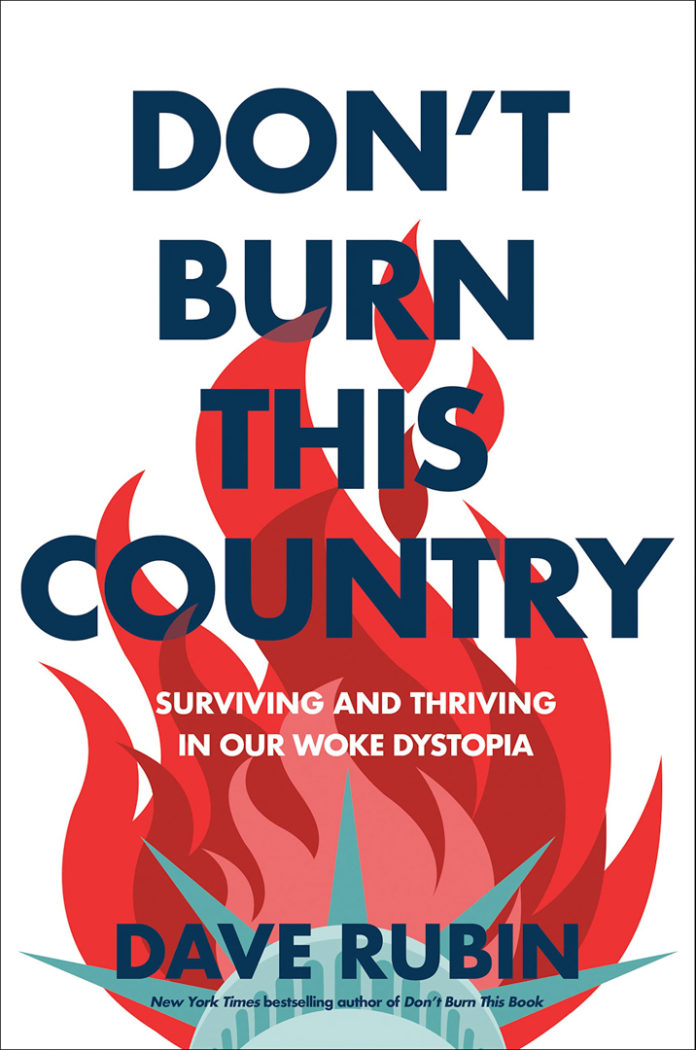Here’s a book that’s going to make you mad. Published in April of this year, Dave Rubin’s latest nonfiction book, Don’t Burn This Country, has a lot to say. If you’re left-leaning, you’ll disagree with almost everything Rubin writes. If you’re right-leaning, you might find his examples of left-wing extremism frustrating and outrageous.
I have to be honest — as a fairly conservative person myself, I was nervous to dive into this book, knowing that I would be writing a review for an arguably left-leaning university. All you need to do is look at the book’s tagline to understand why: Surviving and thriving in our woke dystopia. With the likes of Ben Shapiro and Jordan Peterson, Rubin has taken some of the most controversial topics of the last few years and presented them in this blunt, extremely American book. COVID-19. Black Lives Matter. Fake news. Elections. You name it — he’s written about it, and he’s not afraid to speak his mind.
I’ll start with some of the problems with Don’t Burn This Country. To put it simply, Rubin bashes the left and, as he calls it, the “woke.” He even argues that “it’s no longer right versus left. It’s not red versus blue. It’s woke versus everyone else.” He advocates for a sort of unity between “God-fearing” conservatives and “secular, libertarian” conservatives, also known as “refugees of the left.” It’s about tolerating different beliefs for the sake of fighting for freedom.
While I understand where he’s coming from, the main problem with this argument — and with the book as a whole — is that Rubin seems to be comparing the extremism of the left with the ideals of the right. Certainly, in his ideal world, the right would be as tolerant and accepting as he says. But conservatives, just like progressives, are human. We’re always going to be intolerant if something doesn’t align with our values or beliefs.
Another problem — perhaps because I’ve had to list citations for every essay I’ve ever written in university — is that Rubin sometimes makes outrageous statements without any sources to back them up. For example, he claims that COVID-19 “may actually be a leaked bioweapon from a lab in Wuhan, China.” I don’t care if it’s true. I just want a trusted source to see where he’s getting his information.
These problems alone may convince you to never pick up this book, but I want to balance the scales. I actually agree with a lot of what he says. One of the things he talks about is the media and how it can twist our biases and censor anyone it likes. His solution? Don’t be spoon-fed by the media. Get off social media, get off Netflix, get off news sites — think for yourself and stop getting swept up in politics. This is, of course, an ironic statement coming from a political commentator, but his solution still rings true.
I’ve read some of the subreddit for the topic of Dave Rubin and let me tell you — a lot of people don’t like him. One reason given to dislike Rubin is because he seemed to “jump ship” from a progressive to a conservative — or a libertarian, or a self-described “classical liberal” — which is perhaps complicated by the fact that Rubin is a gay married man. Wait, a gay conservative? Rubin actually argues that the left tends to group people according to their characteristics — sexual orientation, race, gender, etc. — and that if you vote for a certain person while belonging to a certain group, you’re not a true representation of that group.
Ultimately, I believe that if you are truly thinking for yourself, you cannot be a pure conservative or progressive. As individuals, our ideas and beliefs are much more complex than that. You are always going to have beliefs that differ from your political leanings — and that’s okay. After all, we are not made for a political leaning, but rather the other way around.
If there’s one thing Rubin advocates for, it’s to think for yourself. It’s about the individual rather than the “collective.” I can just imagine him crying out, “Freedom!” as he wrote this book. If any of these ideas in this review make you shift uncomfortably in your seat or send you ranting on your car ride home, grab a copy of Don’t Burn This Country and sit with the controversy. You don’t have to agree with it. Just read it for yourself.
Danaye studies English and procrastination at UFV and is very passionate about the Oxford comma. She spends her days walking to campus from the free parking zones, writing novels she'll never finish, and pretending to know how to pronounce abominable. Once she graduates, she plans to adopt a cat.


